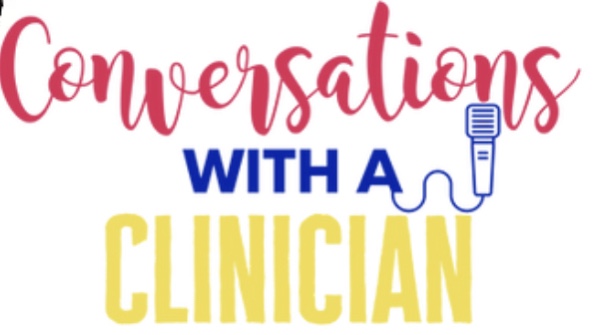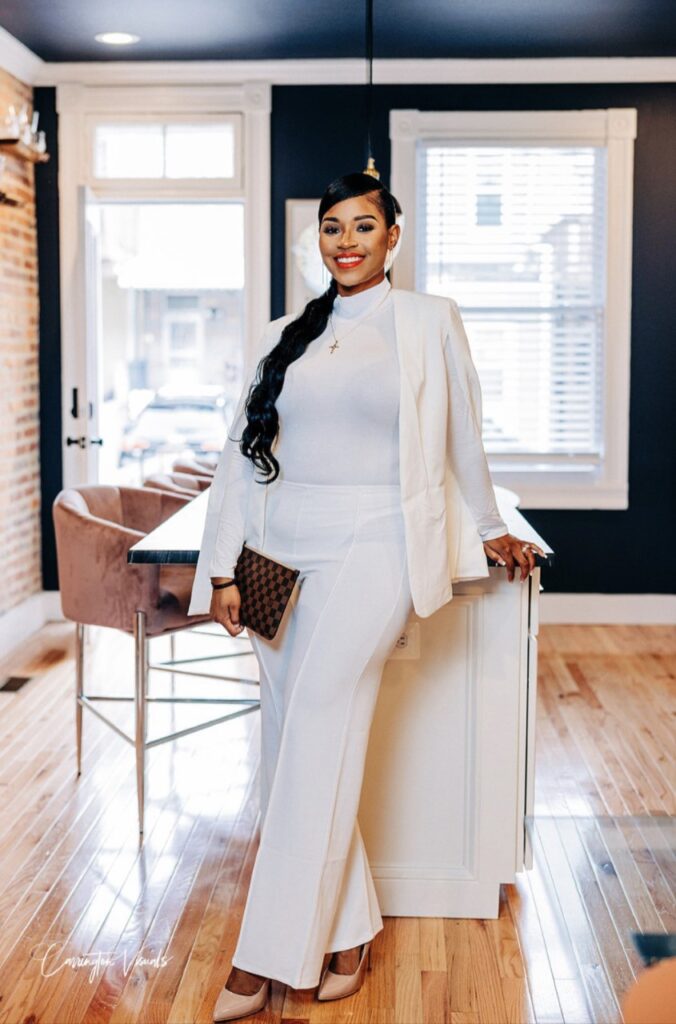( ENSPIRE Community Spotlight ) Lowe-Simmons is Trying to Create a Space for Women in Minorities to Learn, Empower, and Grow Through the Challenges of One’s Mental Health
ENSPIRE Contributor: Alexandra Rivera
Dr. Ashley Lowe-Simmons, LCSW-C (Licensed Certified Social Worker – Clinical), FSW (Female Social Worker), is a wife, mother, and clinician. Lowe-Simmons graduated from the University of Southern California this past May, earning her doctorate in Social Work. She is the CEO of Conversations with A Clinician (CWAC), which focuses on creating a safe space for Black and Hispanic women to heal by having healthy conversations.
She is also the founder of the non-profit Momz On A Mission (MOMI), created to build exposure, mentorship, and financial empowerment for single mothers. Dr. Simmons lives by what she has coined the three M’s: Moms, Money, and Mental Health. That is what she has dedicated her life to.
Dr. Lowe-Simmons focus’ on helping women from minorities because of the stigma surrounding mental health many grew up with. The reasons for this are lack of availability, finding time off, the strong belief that services do not work, racism, bias, and lastly lack of insurance coverage.
43.8 million adults experience mental illness each year. Black and Hispanic Americans use mental health services at less than 1/2 of the rate White Americans do. This is why it is so important to spread awareness and help where you can, which is precisely what Dr. Ashley Lowe-Simmons is trying to do.

What caused you to start your business and become so passionate about the three M’s (Moms, Money, and Mental Health)?
Honestly, it’s all due to life experiences. I’m a third-generation single mother and I understand the trauma associated with single mothering while Black, as well as the financial stressors of being the primary caregiver. Doctors told me early in life that I would not be able to have children because of a medical condition, endometriosis.
It is an extremely painful medical condition that impacts a female’s reproductive system (uterus, ovaries, Fallopian tubes, etc.). It causes tissue (endometrium) that normally lines the inside of your uterus to grow outside of the uterus. When I became pregnant, my relationship with God deepened. When I gave birth, I became a believer that God really could do miracles. I consider my biological daughter a blessing from God.
I began to grow passionate about mental health during this time because I dealt with perinatal (postpartum) depression and a family that didn’t fully understand why I was depressed. Depression has the ability to sneak up on you and I’ve found in many Black and Brown cultures that the fix is generally one of the cliche sayings:
“You’ll be okay”, “Get over it”, “Toughen up”’ or “Don’t let them see you sweat”.
Which are inappropriate for someone dealing with mental health challenges. I was sweating and I was not okay. I didn’t feel adequate enough to fully care for a little human. The icing on the cake is my professional and academic experiences I encountered so many Black and Brown, single mothers that shared the same struggles. Academically, my doctoral research proved that Black and Brown, single mothers have a much harder time than mothers of every other ethnicity. My doctoral Capstone focused on increasing financial capability, shifting the narrative, and dismantling generational barriers to financial wellness for Black and Hispanic single mothers and their families.

What challenges did you have to overcome to be where you are today? Did you have any setbacks?
I had to overcome and learn to manage the life-long impacts of childhood trauma, stress, depression, and anxiety. My life seemed like there was always a hurdle present, but I ran track in high school, and hurdles were my favorite race, so I always figure out how to jump over the challenge. People doubted me. People were acting funny and betrayed me, but God’s plan for my life could not and still cannot be altered by man.
How do you manage your time being a mom, wife, and owner of multiple businesses? Does it become overwhelming at times?
Honestly, it is not easy; it is extremely hard. I often tell my clients that everything in life is hard. We have to choose our hard. I am intentional in everything that I do. Businesswoman, I meet with my manager to help me organize my creative ideas, and she adds people to the team as she sees fit. Meeting with my therapist is a normal routine. I have to ensure that I am well to work with others. I don’t want to be a disservice to anyone in my life. The calendar is my saving grace, if it isn’t on my calendar then the chances of it happening are very slim.
I have been a mom for what feels like my entire life so it comes pretty naturally, I know how to take care of people. Before I was married, my daughter, Nyla, and I started Mommy and Me Mondays. She chooses what we will and it is just her and I. When I became a bonus mom, she was not excited to share me. Often times I feel pulled between Nyla and my husband, so I have to make time for both of them. I also try to attend my bonus children’s activities as often as possible. We plan family outings as well. So, we work it into all the busyness of life.
This “wife life” is an adjustment. I have been single longer than I’ve been married, so I pray with my husband daily. I speak into his life and pray over him when he is sleeping. One of the best questions that we ask one another is, “What do you need me to be for you today?” In life, we grow and evolve, so it is important for a healthy marriage that we communicate and understand each other. Intimacy is critical, so I keep it spontaneous; we also date and travel. Our goal is to create experiences together.
With the connection between financial habits and mental health, what are some common ways you see people struggling with the two, and what are some ways to change those habits to benefit one’s mental health?
Almost half of the American population deals with financial problems. Statistically, the average American is unable to afford a $400 emergency expense. Financial stress can be related to a lack of skills, knowledge, or insufficient income. Recently, I’ve witnessed individuals being faced with foreclosure, unable to cover rent, medical and credit card debt. People are having challenges paying for the basic necessities of life. Knowledge is power, the more educated you are, the better choices you make.
Behavioral change is key, and lifestyle changes can help to lessen stress, but unfortunately, we cannot stop rising inflation rates. Stress can cause ruminating, intruding thoughts, constant worry, fear, and anxiety. All can lead to biological problems (heart problems, weight loss, and weight gain). Stress management is our lifeline during challenging financial times, one of the best ways to de-stress is through exercise and a whole, healthy diet (fruits, veggies, and water), breathing, planning, journaling, and therapy.

Minorities across the US are less likely to receive mental health care than other groups. How are you helping overcome the stigma of mental health in minority communities? What is your goal in tackling this issue?
Minorities are definitely one of the majority groups that have a stigma about mental health treatment. I personally feel that one of the reasons is that we have been born and birthed into trauma. And that trauma stretches back to slavery times. That trauma transfers down generational lines, and we need to understand the brain and body’s response to trauma. I am educating myself on trauma and its impacts from historical lenses, as well as interviewing individuals on the intersectionality of life and mental health on my Facebook show, Conversations With A Clinician.
You can educate yourself too. Check out these three great books to help understand trauma:
Post Traumatic Slave Syndrome By: Dr. Joy DeGruy Leary
The Body Keeps The Score By: Dr. Bessel van der Kolk
The Unapologetic guide to Black Mental Health By: Dr. Rheeda Walker
Since you were recently on NBC 5 during Minority Mental Health Awareness Month, were you excited about this opportunity? Did you think it helped with raising awareness and creating more traffic to your platforms?
I was extremely excited about the opportunity. And yes, I do believe that it helped to increase awareness about a specific mental health challenge for many Americans, especially since Seasonal Affective Disorder is more common during colder seasons. Summertime Depression isn’t as common, so the tips that I shared could have sparked something to encourage listeners to take the initiative to learn.
Financial wellness is a process, and there are steps to it. Our mental flexibility determines the outcome of our financial lives. We must have a willingness to learn, be patient, and embrace our financial journey. Will it be easy? Absolutely not, but if you are disciplined and have a plan, you can accomplish your financial goals. If you are unable to pay down, at least make the minimum payments. Communicate with your debtors to explain your financial hardships. They may even be willing to work with you on decreasing your payment amounts.
I saw on your social media that you are going to be doing a TED Talk in September, what can viewers expect from your talk?
Yes, that is correct. I do have a TedX talk coming up in September. Viewers can expect to get a taste of my poetic ability, a sprinkle of my story, and a better understanding of the role mothers play in financial socialization within the household. Children are like sponges that absorb what is seen and heard, then go and mimic what has been learned. Financial behaviors or the lack thereof will determine how a child is acquainted with money scripts.
How would you recommend people stay active in spreading awareness all year round?
Many people of color simply do not take mental health seriously, so we do not talk about it.
I feel it is important for people of color to understand that our Mental Health is the foundation for anything that we build in life. Awareness can be spread by having conversations within families, learning about what mental health is, and being okay with seeking help.

Dr. Lowe-Simmons is changing the way minorities see mental health. She is trying to help women in need whereas many others would not. She does this through conversation, talking through your issues so that you can move forward from them and make smarter decisions. She has amassed 3 thousand followers so far and her impact is only going to continue to grow.
Related Articles: Tyrell Zimmerman: A Mission to Address Mental Health and Trauma Among Urban Children, Juliet Ramos Uses Podcast to Promote Mental Health







